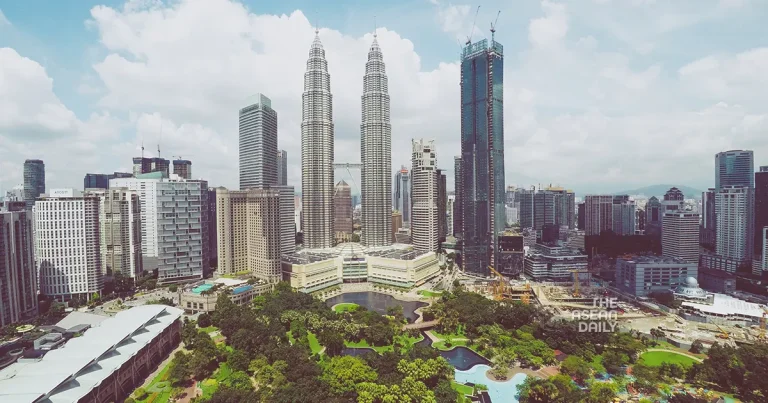6-4-2024 (KUALA LUMPUR) In a striking act of disapproval towards the Canadian government’s unwavering support of Israel’s actions against Palestinians, an Ontario-based couple has taken the bold step of relocating their family to the Southeast Asian nation of Malaysia. The Salehs, Muhammad William and Sana, along with their three children, now call Kuala Lumpur home and run a YouTube channel boasting an impressive 1.28 million subscribers.

The “Saleh Family” channel has recently been extolling the virtues of their new life in Malaysia, a decision driven by the stark contrast between the two nations’ stances on the Israeli-Palestinian conflict. “We continuously watched our leaders in Canada making statements in support of Israel, and we couldn’t bear the fact that our tax dollars were contributing to this,” Sana revealed in an interview with This Week in Asia.
Malaysia’s stance, diametrically opposed to that of Canada, proved pivotal in their choice. “We see the Palestinian flag everywhere; they boycotted companies that supported Israel,” Sana explained. “It is the simple fact that Malaysia is not afraid to stand up and say: ‘Hey, we support Palestine and the Palestinian cause’.”

The Salehs’ relocation mirrors a broader trend of Muslim expatriates finding inspiration in the Hijrah – the Prophet Muhammad’s historic journey from persecution in Makkah to the safety of Medina, an event that ensured the survival of a then-fledgling religion. Other Muslim content creators, such as British national Saira Hayati and Canadian couple Mahdi and Sagal, have also chosen Malaysia as their new home.
Malaysia’s allure extends beyond its stance on the Israeli-Palestinian conflict. The nation’s large Muslim population, constituting more than 60% of its 33.7 million residents, and the enshrinement of Islam as a state religion, serve as potent draws for Muslim travellers and long-term residents seeking halal food and abundant mosques.
The Salehs’ video announcing their move, published on March 20, has garnered over 136,000 views, with comments flooding in from individuals inquiring about the relocation process and sharing positive anecdotes about Malaysia.
“It’s absolutely insane, it is astronomical,” Sana remarked. “We get dozens of emails and thousands of comments from people asking us how we did it, what the process is like, and that they want to do the same.”
Shadia Yousuf, another Canadian Muslim, echoed this sentiment, expressing her consideration of making the leap to Malaysia, a decision shared by many in her circle. “I visited Malaysia for an exchange programme and thought it was such a beautiful place,” Shadia said. “A place I could easily adjust to and settle in for many reasons.”
Malaysia’s resurgence as an expatriate destination is not limited to the Muslim community. The country’s temperate climate, beaches, cuisine, lower cost of living, government visa offers, and reputation as Southeast Asia’s most developed large nation have lured a diverse array of expatriates.
Singapore-based YouTuber Max Chernov, who has interviewed numerous Western expatriates in Malaysia, cited the country’s appealing blend of factors, including “great food, widespread English proficiency, a significant expat community, and friendly and respectful locals.”
Moreover, the recent economic downturn and the Malaysian ringgit’s historic low against the US dollar have further amplified the country’s appeal, allowing expatriates to stretch their budgets.
The Malaysian government has actively courted foreign residents through the Malaysia My Second Home (MM2H) programme, offering multiple-entry social visit passes to retirees and working expatriates who meet specific income and investment requirements.
While the upscale Kuala Lumpur neighbourhood of Mont Kiara has long been a hub for expatriates, the foreign-born population is now dispersing to other regions, drawn by the rustic charms of Penang and Malacca, where life unfolds at a more leisurely pace.
“The MM2H programme attracts the target demographic of big spenders who tend to buy or rent homes in touristy locations,” explained Kashif Ansari, co-founder of property solutions provider Juwai IQI. “They do not compete with Malaysians for housing.”
The programme has seen a steady rise in participants, with East Asians from China, South Korea, Japan, and Taiwan making up a significant portion, while Britons and Americans lead the charge from the West.
Lower costs for a comfortable lifestyle remain a primary draw. For the price of renting a three-bedroom public housing flat in Singapore, one can secure a comparably sized luxury condominium encircling the iconic Petronas Towers in Kuala Lumpur, one of Malaysia’s most coveted addresses.
The recent revision of the MM2H programme, lowering financial requirements and reducing the minimum age to 30, has opened the doors to a new cohort of digital nomads flocking to Asia in the post-pandemic era.
Beyond the urban centres of Peninsular Malaysia, the states of Sabah and Sarawak on the island of Borneo, rich in natural wonders, have seen a surge in MM2H applications, with Sarawak alone approving over 700 applications in 2022, up from just 27 in 2021.
However, for some expatriates, the allure of Malaysia is tempered by challenges. Emmanuel Chukwuemeka Olalere, a Nigerian who has lived in Malaysia for 11 years, is considering leaving due to the daily racism and discrimination he has endured.
“In other countries, I would have been a citizen by now, yet here I am still on a visa,” lamented Emmanuel, who operates a tech review YouTube channel called Geekception.
Despite enjoying Malaysia’s food and having built a life there, Emmanuel cites the “trade-off” of dealing with systemic discrimination against non-citizens and casual racism among the local population, which has hindered housing opportunities for Africans in the country.
Malaysia’s relationship with African migrants has been uneasy, with reports of crimes involving the community often sensationalised by the local media’s use of derogatory terms.
The country is also grappling with managing its sizeable migrant-worker population, particularly from Bangladesh and the Rohingya refugee community, whose perceived domination of certain economic sectors has sparked resentment among low-income Malaysians struggling with rising costs of living.
Conversely, the creeping Islamisation of Malaysian society, which has drawn many Muslim expatriates, has prompted some Malaysians to seek new lives overseas. Films have been banned for un-Islamic content, with their makers receiving death threats and legal action, while shops have been attacked for selling socks with the word “Allah” printed on them – events that paint a grim picture of a Malaysia sliding towards religious fundamentalism.
“That is not the Malaysia I left behind, and it does not sound like a place I want to come home to,” said Shamsul Baharin, an accountant who relocated his family to Britain 15 years ago.
While acknowledging that his adopted home has its own issues, Shamsul lamented the heartbreaking transformation of his home country. “I always tell people there is no place like Malaysia,” he said. “It’s even more true now: that Malaysia I talk about is no more.”
As Malaysia navigates the complexities of its multiculturalism and religious identity, its appeal as an expatriate haven remains a delicate balance, offering solace to some while presenting challenges for others.




